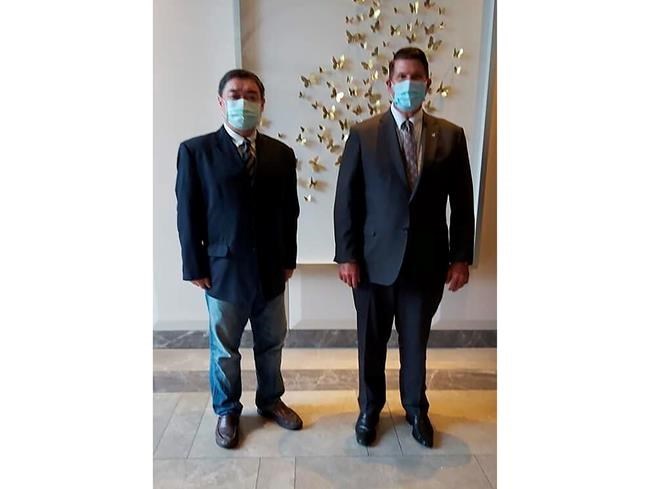
In this photo released by Wu'er Kai Xi, one of the top dissidents from China's Tiananmen Square massacre Wu'er Kai Xi, left, poses with visiting U.S. Under Secretary of State Keith Krach in Taipei, Taiwan, Friday, Sept. 18, 2020. Krach, the second high-level U.S. envoy to visit Taiwan in two months began a day of closed-door meetings Friday as China conducted military drills near the Taiwan Strait after threatening retaliation. (Wu'er Kai Xi via AP)
Republished September 18, 2020 - 5:10 AM
Original Publication Date September 17, 2020 - 11:11 PM
TAIPEI, Taiwan - China’s military sent 18 planes including fighter jets over the Taiwan Strait in an unusually large show of force Friday as a U.S. envoy held a day of closed-door meetings on the self-governing island claimed by China.
Under Secretary of State Keith Krach, who handles the economic growth, energy and the environment portfolio, held talks with Taiwan's minister of economic affairs and vice-premier. He also met with business leaders over lunch and was to dine with President Tsai Ing-wen later Friday.
In response to Krach's visit, the Eastern Theater Command of the Chinese People’s Liberation Army held combat exercises near the Taiwan Strait, in at least the second round of war games this month aimed at intimidating supporters of the island's independent identity.
Taiwan’s defence ministry said two bombers and 16 fighter jets from China crossed into Taiwan’s air defence identification zone. It said it scrambled jets in response and monitored the movements of the Chinese planes.
Chinese defence ministry spokesperson Ren Guoqiang called the drills a “legitimate and necessary action taken in response to the current situation across the Taiwan Straits to safeguard national sovereignty and territorial integrity."
“Recently, the U.S. and (Taiwan's ruling) Democratic Progressive Party authorities have stepped up their collusion and frequently stir up troubles," Ren told reporters Friday morning. “Whether it is using Taiwan to contain China or relying on foreign powers to threaten others, it is wishful thinking and is destined to be a dead end."
In a brief message on its microblog, the Eastern Theater Command said the exercises involved naval and air force units in the Taiwan Strait aimed at gauging their ability to carry out joint operations.
China's Ministry of Foreign Affairs also defended the move. Ministry spokesman Wang Wenbin said China has the “firm will, full confidence and sufficient ability to thwart all external interference and separatist actions by Taiwan independence forces.”
Beijing views Taiwan as part of its own territory and strongly opposes any type of formal interaction between other countries and the self-ruled island democracy.
Krach's trip follows a visit in August by U.S. Health Secretary Alex Azar, the highest-level U.S. Cabinet official to visit since the U.S. switched formal relations from Taiwan to China in 1979.
It is one of a series of moves by the Trump administration to strengthen relations with Taiwan, including stepped-up arms sales and support for the island's participation in international forums.
Before Krach's arrival, the U.S. ambassador to the United Nations, Kelly Craft, had lunch Wednesday with Taiwan’s top official in New York, in a meeting she called historic.
On Saturday, the last day of his visit, Krach will also attend a memorial service for former President Lee Teng-hui, who led the island’s transition to democracy and died at age 97 in July.
Analysts say the Chinese military response is a clear message to the U.S. to stop what it is doing, since the Chinese side took similar actions when the U.S. health secretary visited in August.
"I think the Chinese are using this tool to try and stop the kind-of diplomatic relationship between the U.S. and Taiwan. It’s very clear from them,” said Alfred Wu, associate professor at the Lee Kuan Yew School of Public Policy at the National University of Singapore.
Tensions between Washington and Beijing have already reached high levels as the governments spar over the coronavirus pandemic, trade, technology, Hong Kong and the South China Sea.
The frequency of Chinese exercises near Taiwan recalls the last major crisis between them in 1995-96, when China fired missiles near the island and held war games in a bid to intimidate voters in Taiwan's first direct presidential election. Those actions were largely seen to have backfired.
Taiwan said Chinese warplanes entered its airspace over two days last week during large-scale war games that it called a “serious provocation to Taiwan and a grave threat to regional peace and stability.”
Such actions by the Chinese military threaten the entire region, it said, calling on the international community to respond.
China has increasingly relied on military threats and diplomatic isolation to pressure Taiwan. That follows the apparent failure of its efforts to win over the island’s 23 million people to the prospect of political unification under the “one country, two systems” framework used in Hong Kong, with a large majority of Taiwanese favouring maintaining the status quo of de facto independence.
Despite of the frequency of the exercises, analysts said it does not mean imminent war.
“The signal from Beijing is very, very clear, but does that mean a prelude to war? No, far from it,” said Chong-Pin Lin, a former deputy defence minister in Taiwan.
China cut contacts with Taiwan’s government following Tsai's 2016 election. She was reelected by a large margin this year and her Democratic Progressive Party maintained its majority in the legislature.
___
This story has been corrected to show that the flyover took place Friday, not Monday.
News from © The Associated Press, 2020